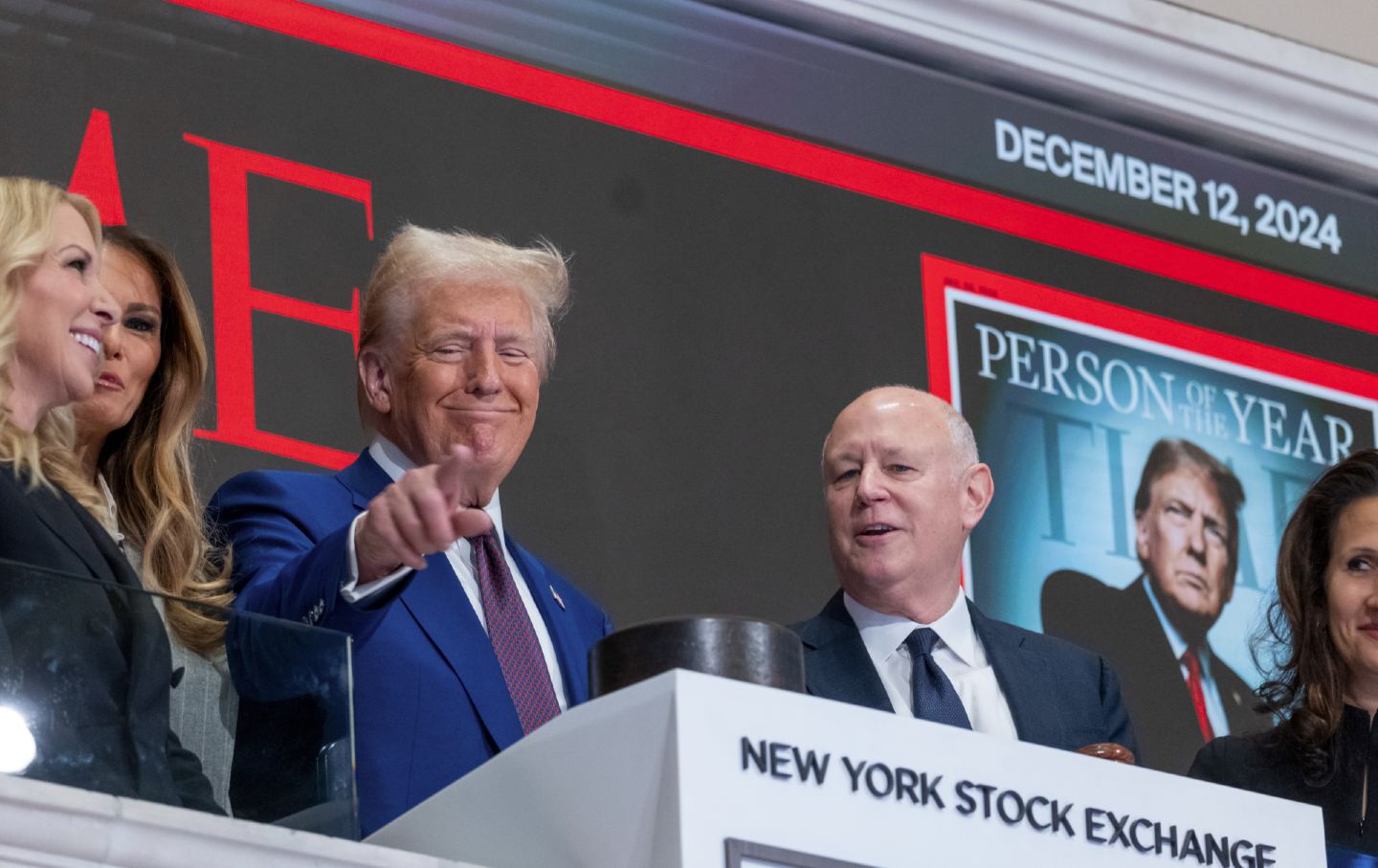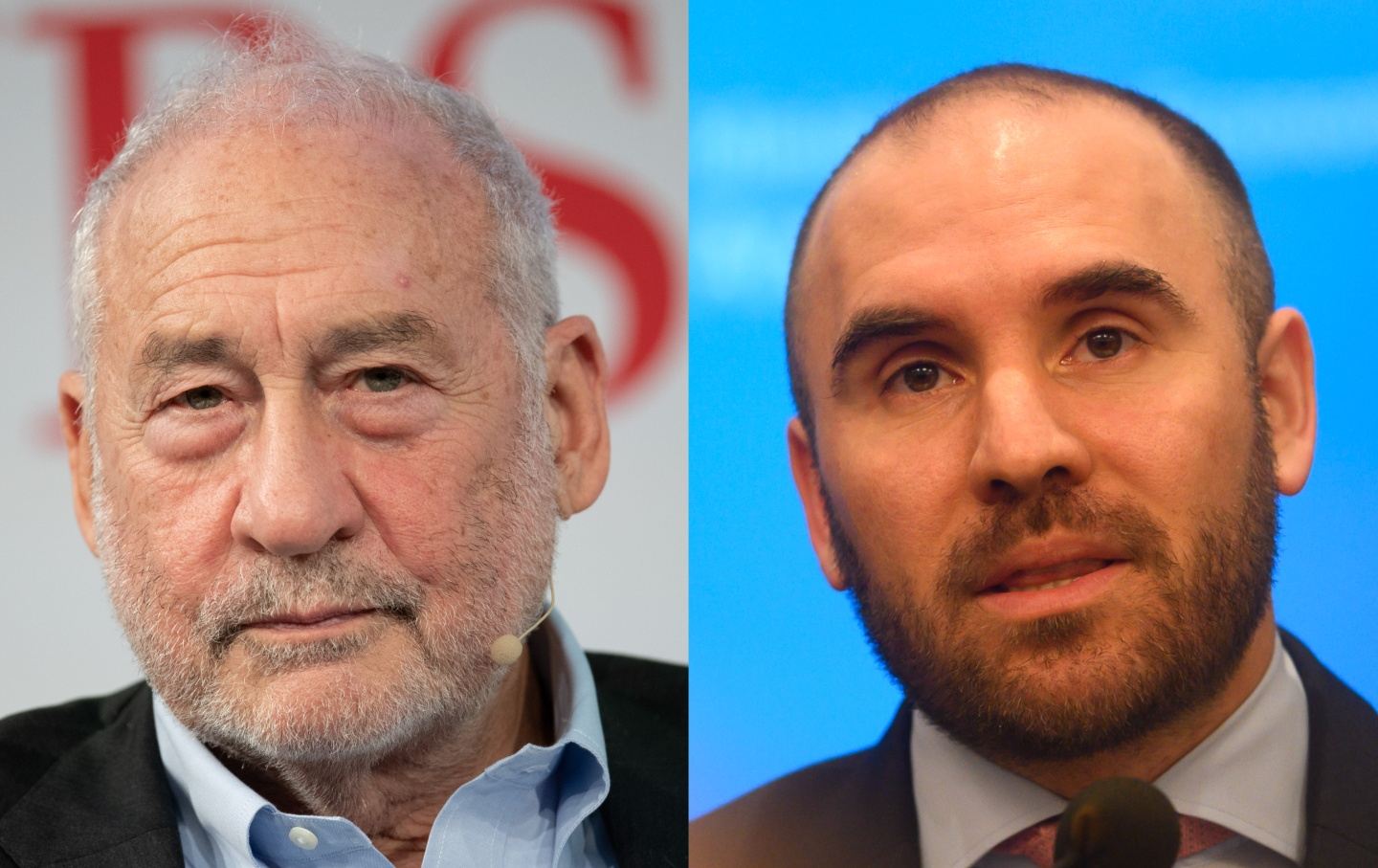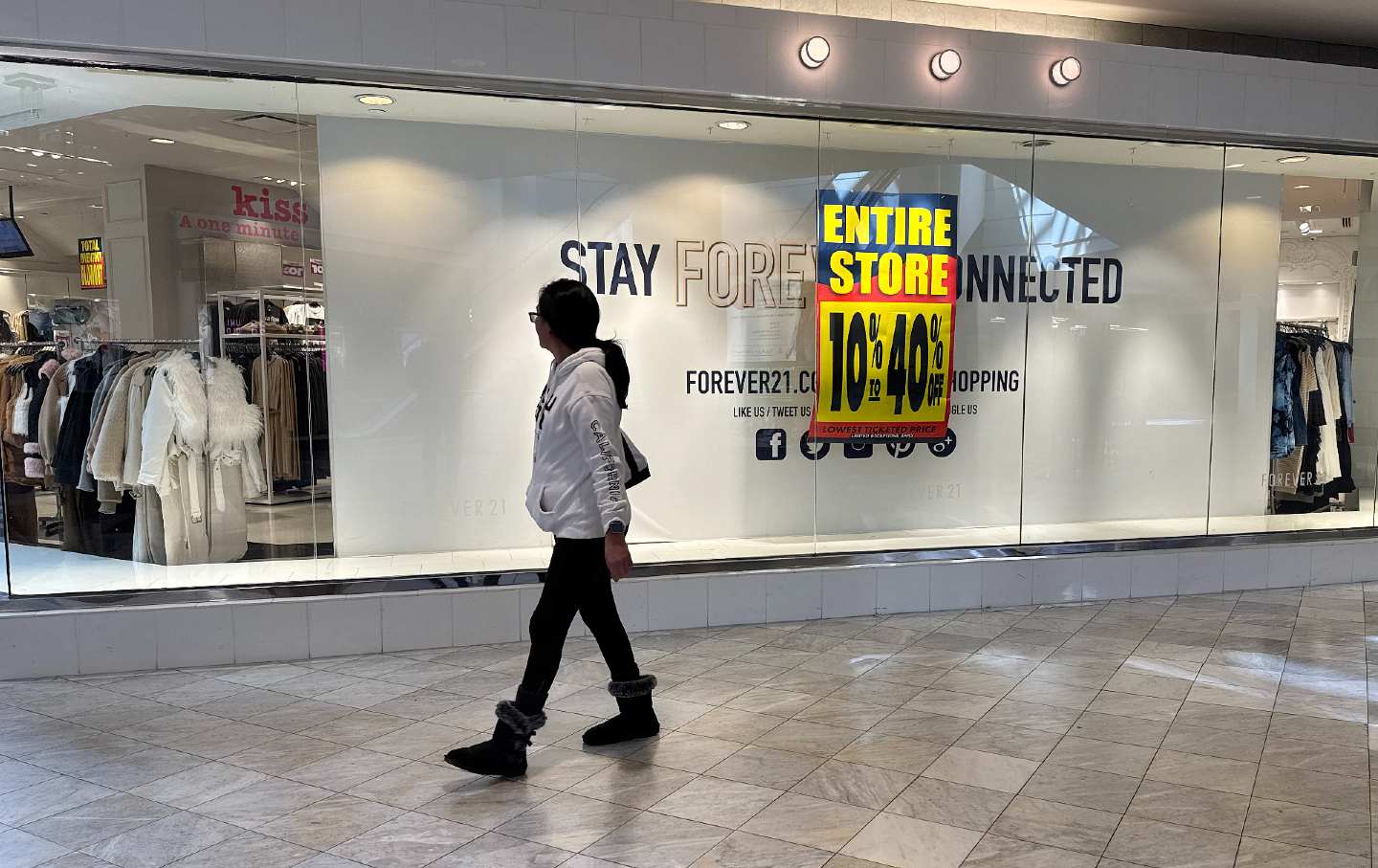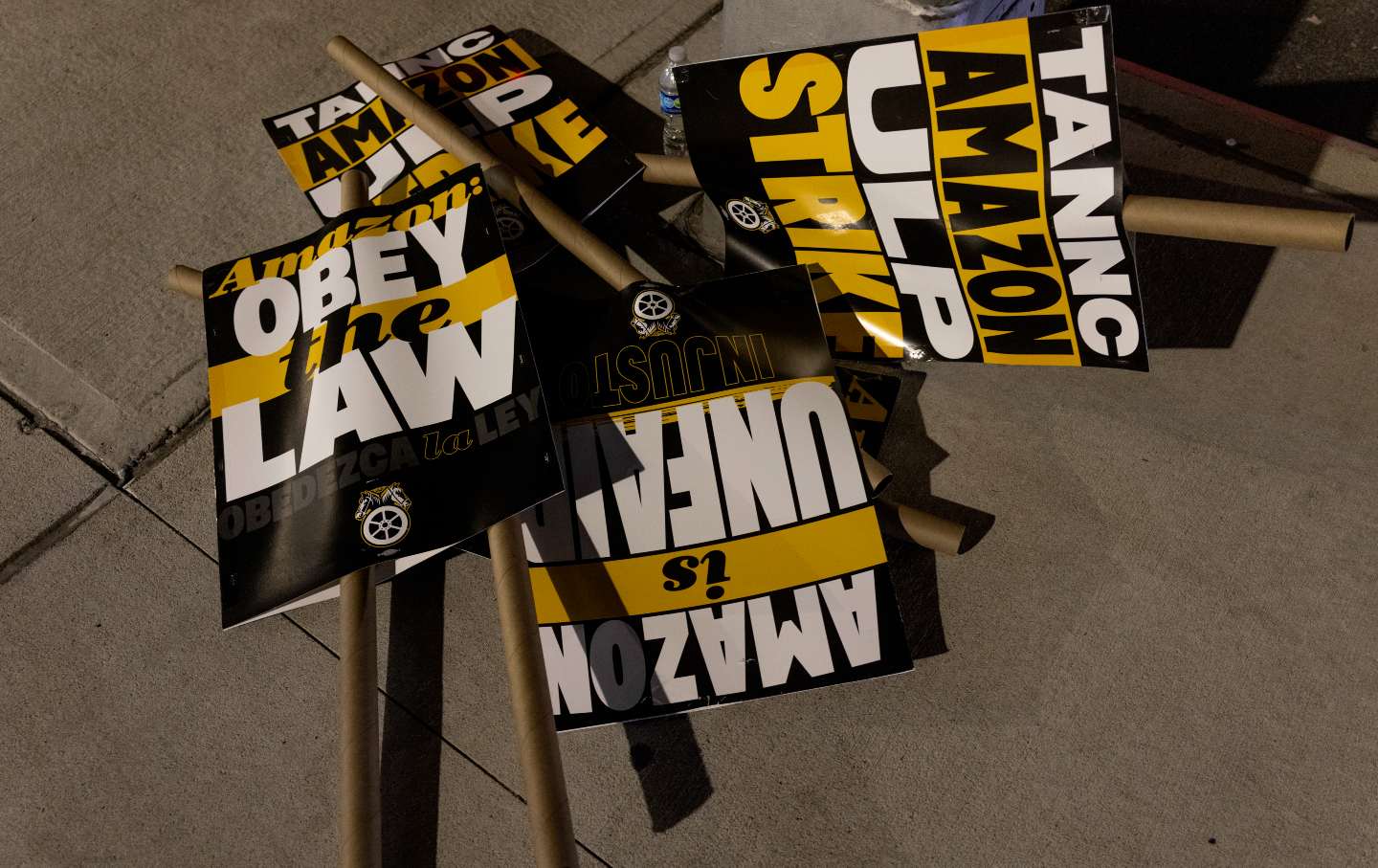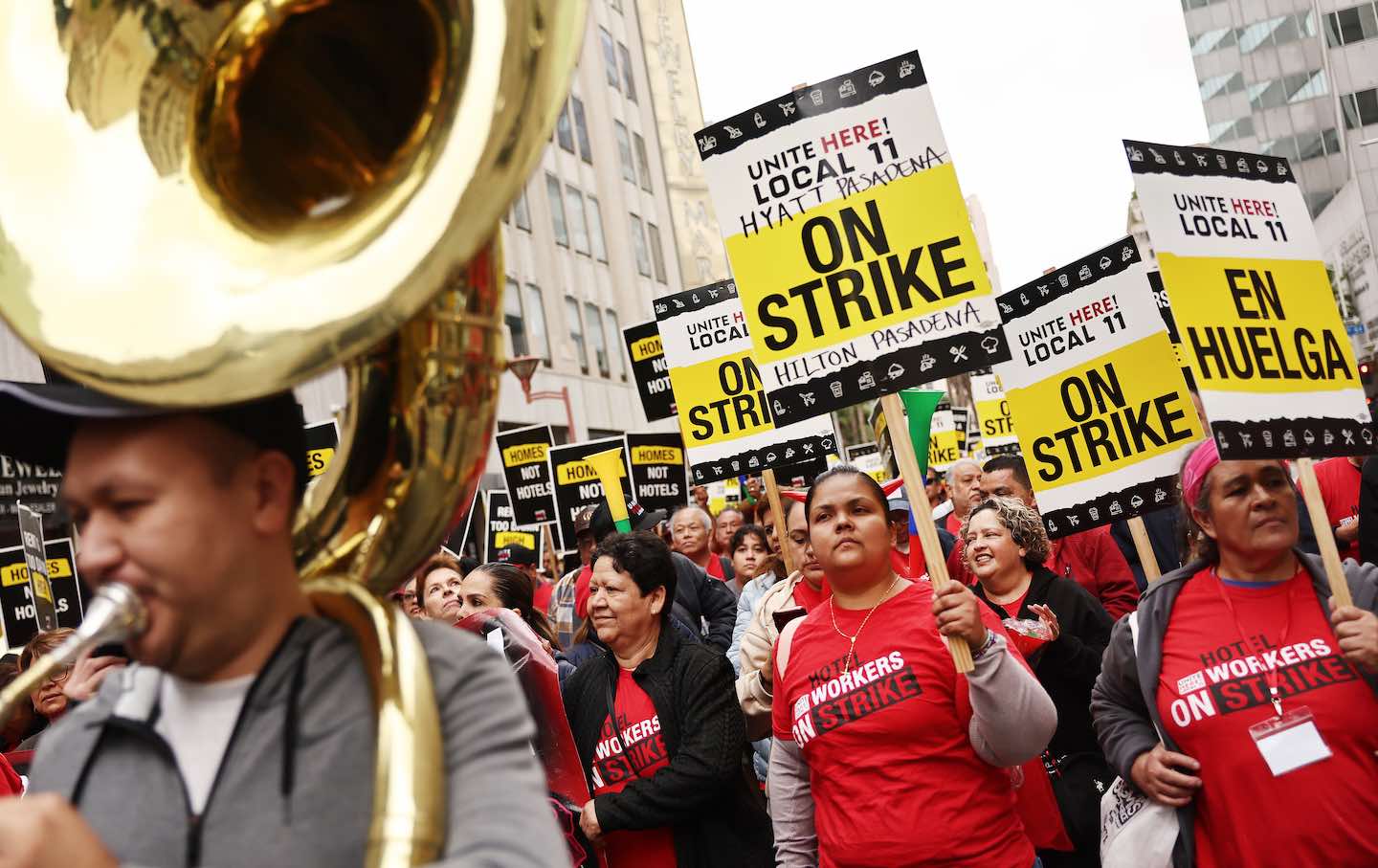
Hotel workers with Unite Here Local 11 march through downtown LA on October 25, 2023.
(Mario Tama / Getty Images)Months after the end of the screenwriters’ and actors’ strikes, another Los Angeles labor action continues apace. The city’s forgotten strike is that of the hotel workers organized by Unite Here! Local 11, who have been engaged in a series of rolling strikes against dozens of LA-region hotels. Even as workers’ contracts have expired, the hotels have balked at agreeing to new contracts with union negotiators.
In recent weeks, an increasing number of owners have cried uncle and settled with their workers, agreeing to improved pay rates, better benefits packages and stronger worker protection measures. As of this week, thirty-four hotels have agreed to new contracts, which include a $5-per-hour initial pay increase, translating to a 20 percent hike in wages, and a cumulative pay increase of $10 per hour by 2027 for room attendants, cooks, and other non-tipped workers. The hotels also agreed to continue paying the vast majority of health insurance premiums for employees and their families, with the workers themselves not having to pay more than $20 per month.
This continues an emphasis that Local 11—one of a slew of progressive, activist, service-sector unions that have risen to the forefront of labor organizing in Los Angeles, Las Vegas, and other western cities in recent years—has placed on winning not just better wages, but, equally importantly, better benefits: since 2018, the union has secured pension contribution increases from the hotels totaling 600 percent. As a result, their pension fund is one of America’s best funded for service workers. They have also pushed for equitable hiring opportunities for people with criminal justice convictions, and for increased protections for immigrant workers. Cumulatively, this package represents an extraordinary win for labor in the country’s second-largest city.
Many other hotels, however, including well-known Downtown hotels such as the Hotel Figueroa, have, so far, refused to settle with the union. In February, more than one hundred non-unionized food and beverage operators who were trying to unionize were fired at the Figueroa. That same month, several striking workers were shot at with ball bearings by unknown assailants, as they walked the picket line outside the hotel—one was hit in the head. In the wake of these developments, Local 11 called for a boycott of the hotel. They also called for a boycott of the Maya Hotel, in Long Beach, which has also seen violence against striking workers.
“We’ve been doing this fight for eight months now,” says Nohelia Gonzalez, 52, who has worked as a housekeeper at the Figueroa for the past three years. “The hotel knows what’s been going on, that we’ve fighting for this contract for months now, and they’ve chosen not to listen to us.”
The union is particularly incensed about the firing of the non-unionized workers and has asked the city’s district attorney to open an investigation to determine whether the action violates the new Los Angeles Hotel Workers’ Retention Ordinance. This measure came out of the pandemic, putting in place protections for temporarily laid-off workforces so that they would be rehired as the hotels bounced back from the pandemic closures. Local 11 alleges that the hotel closed the restaurant on February 11 and reopened two days later with brand new workers, thus doing an end-run around the unionization efforts.
For Gonzalez, this speaks to a broader issue: what the union sees as management’s disregard for the basic needs of its workforce. One of the union’s biggest complaints is that workers are paid too little to allow them to afford housing, in LA’s expensive housing market, that is near their place of employment. Gonzalez herself commutes two hours each way, on two busses and the LA Metro, from her $2,250 per month rental unit. On the $24 per hour that she currently earns—a wage that in some states generates at least a degree of economic stability, but in California doesn’t allow workers to build up savings and security—she can’t afford to pay the higher rents that landlords charge nearer the center of the city.
“So we’re going to continue to fight,” Gonzalez says. The union is, according to spokesperson Maria Hernandez, urging would-be customers at the Figueroa “not to eat, sleep, party, spend money, patronize the hotel until a contract is signed, workers are brought back, and there’s an end to the violence.”
Support independent journalism that exposes oligarchs and profiteers
Donald Trump’s cruel and chaotic second term is just getting started. In his first month back in office, Trump and his lackey Elon Musk (or is it the other way around?) have proven that nothing is safe from sacrifice at the altar of unchecked power and riches.
Only robust independent journalism can cut through the noise and offer clear-eyed reporting and analysis based on principle and conscience. That’s what The Nation has done for 160 years and that’s what we’re doing now.
Our independent journalism doesn’t allow injustice to go unnoticed or unchallenged—nor will we abandon hope for a better world. Our writers, editors, and fact-checkers are working relentlessly to keep you informed and empowered when so much of the media fails to do so out of credulity, fear, or fealty.
The Nation has seen unprecedented times before. We draw strength and guidance from our history of principled progressive journalism in times of crisis, and we are committed to continuing this legacy today.
We’re aiming to raise $25,000 during our Spring Fundraising Campaign to ensure that we have the resources to expose the oligarchs and profiteers attempting to loot our republic. Stand for bold independent journalism and donate to support The Nation today.
Onward,
Katrina vanden Heuvel
Editorial Director and Publisher, The Nation

